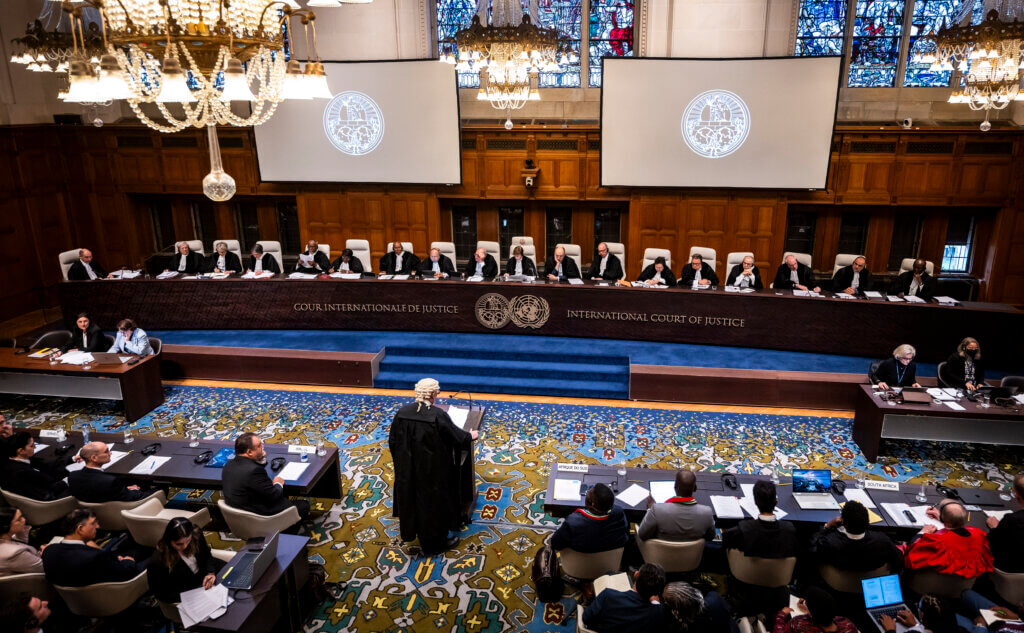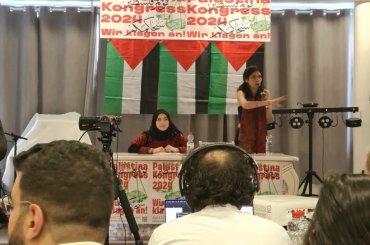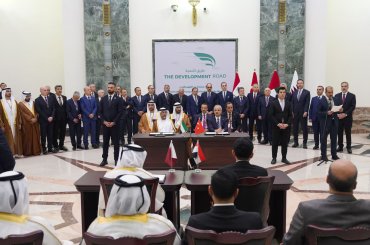Public deliberations about international law have exploded since Israel’s latest assault on Gaza began in October, and they intensified especially after South Africa’s request for “provisional measures” by the International Court of Justice (ICJ) to challenge Israel’s genocide. With the interim ruling issued by the court on January 26, which included an order that Israel prevent genocidal acts but refrained from calling for a ceasefire explicitly, the debate over international law has become more polarized, even among those who would fall together within “the Palestinian side.” Despite the conflicting responses to this question of international law’s effects, I think that they all converge around the way in which international law crystallizes hope: hope held out and hopes dashed.
“What can international law do in the service of Palestinian liberation?” is a question that has always been widely debated by Palestinians and others. Since Great Britain claimed the right to govern Palestine under the auspices of the League of Nations, Palestinians and their advocates have struggled to claim their individual and collective rights and freedoms through frameworks positioned within and against the international legal system.
For some, international law remains hope’s repository — a source for nurturing belief in a future that could be better, in humanity, in justice. It is a source for authorizing political claims around which to organize. The Charter of the United Nations, of which the International Court of Justice is an integral part, is a text that reaffirms “faith in fundamental human rights, in the dignity and worth of the human person.” The UN and the ICJ as “the principal judicial organ of the United Nations” are forums that can reaffirm in a grandiloquent way what should not need reaffirming but still does. When the UN’s purpose of “promoting and encouraging respect for human rights and for fundamental freedoms for all without distinction” is enacted, as it somehow partially was in the ICJ’s ruling, optimism that the topsy-turvy world is not totally insane could be kindled.
For some others, however, international law represents the opposite — a source of false promises and distractions from what’s really needed to fight the battles for justice. For some of those holding this second position — call it more cynical or realistic, call it more radical, or immature — to grasp at international law’s dangling carrots of hope is to mark you out as a traitor to the Palestinian cause.
It is a common critique that international law is a tool of the dominant, too corrupted by the realpolitik of great powers, by racism, by capitalism, and by imperial legacies to offer more than victor’s justice or achieve true justice—at least not on its own. Just a little bit of historical knowledge and political observation confirms these criticisms. The years of reports tracking Israel’s abuse of Palestinians filed by the UN Special Committee to Investigate Israeli Practices Affecting the Human Rights of the Population of the Occupied Territories since it was established in 1969 provide one damning archive. The decades of impunity enjoyed by Israel as it flouts international laws to proceed with the settler-colonial takeover of historic Palestine has been well documented by scholars and human rights advocates.
There is a long history of international legal impotence and hypocrisy fuelling the Tweets of outrage after the ICJ ruling did not call directly for a ceasefire. Some Palestinians have avowed that international law “exists only to protect killers” and that the ICJ’s order is nothing but a “green light” for the invasion of the rest of Gaza. The court’s ruling further proves the global ruling class’s inability to recognize Palestinian humanity. It’s more evidence that Palestinians should give up on international legal-liberal institutions. And “fuck the ICJ,” as journalist Motaz Azaiza clarified in a Tweet that has garnered 5.2 million views and 172,000 likes at the time of writing.
Any other interpretation — such as the one that recognizes an implanted if unspecified call for a ceasefire in the ICJ’s order that Israel “shall ensure with immediate effect” that its military stop killing and injuring Palestinians — is “pure spin.” Calls to build on the ICJ ruling are detached from “what is actually unfolding on the ground,” as those with disappointed hopes have admonished their publics.
I don’t know which grounds are thought to uphold what positions or justify censuring others. But I do know that the political implications flowing from what the ICJ has demanded of Israel, even tempered by a recognition of international law’s entanglements with power, are not so clear or singular. It is “not a small matter” that the ICJ “practically adopted the Palestinian discourse in describing what Israel was doing,” as General Director of the Arab Center for Research and Policy Studies Azmi Bishara pointed out. The ICJ’s order for more generic provisional measures could mean that Israel now stands “legitimately accused of genocide,” as analyst Mouin Rabbani has read the court’s ruling, seeing cracks in the shield of the Holocaust’s legacy wielded by Israel. Similarly, former director of the New York office of the UN High Commissioner for Human Rights, Craig Mokhiber, has hailed the ruling a “historic victory” because it represents “a crack in 75 years of Israeli impunity.” And this could offer a tool to compel other states to intervene and stop the genocide, as legal scholar Noura Erakat believes.
We might consider a counterfactual: what responses would have poured out had the ICJ majority aligned with Ugandan judge Julia Sebutinde? Throwing out the case or a broader vote against the emergency orders to protect Palestinians would have been seen— rightly —as another despicable slap in the face of justice, another blow to the movement for Palestinian rights, and a further disregard for Palestinian lives.
Those decrying the ICJ as a dismissible manifestation of hegemonic power today would have felt worse. This is a barometer of what the ICJ and allied international legal bodies can offer, which is no salvation, but it does include a means for isolating Israel, as Hamas pointed out. That the United States, United Kingdom, and seven other countries have sought to deflect attention from the ICJ ruling by rushing to cease their support of UNRWA, the primary humanitarian agency in Gaza, is more indication of its significance.
International law, in all its guises, has always been a Rorschach test. And in this mix of conflicting interpretations emerging after the ICJ ruling, we see the confounding diversity of political thought and feeling. It should be no surprise, given the existentialism of what’s at stake in the reading of these newly grotesque inkblots smeared across Gaza. This is, after all, the point of the genocide convention: to address what threatens the actual existence of a people. These desperate times are bound to increase the volume of those who care, cloud nuance, and darken hope. Hailing from another country suffocating from fascism’s takeover of the state, Indian author Arundhati Roy once explained, “Hopelessness comes when we’re confused and don’t know what to do.”
But there is no time to not know what to do. The rate at which Israel is pummelling Gaza and destroying Palestinian life is horrifying. It is producing the most brutal, barely-living conditions for those who have managed to survive, increasing the urgency for interventions needed to save lives and cease the destruction. As South Africa’s application to the ICJ stated, Palestinians in the Gaza Strip are at “immediate risk of death by starvation, dehydration and disease as a result of the ongoing siege by Israel, the destruction of Palestinian towns, the insufficient aid being allowed through to the Palestinian population and the impossibility of distributing this limited aid while bombs fall.” The ICJ’s ruling recognized the urgent need for services and humanitarian assistance. The court affirmed “that there is urgency, in the sense that there is a real and imminent risk that irreparable prejudice will be caused to the rights found by the Court to be plausible.“ Judge Bhandari called for all participants in the conflict to “ensure that all fighting and hostilities come to an immediate halt.” The language of urgency, “irreparable consequences,” and immediacy that fills the pages of the case do affirm Palestinian humanity. Something that should not need affirming, but in this world, repeatedly does.
There is hope that this ruling will prompt more Jewish people, especially American Jews who have grown up blinded by Zionist propaganda about socialist deserts blooming, to open their eyes. Maybe this ruling is forcing their recognition of the painful reality of what Israel is: a settler-colonial, apartheid regime, with fascistic tendencies towards genocidal violence against those they deem other to (their specific definition of) their tribe. And maybe it has encouraged more people everywhere to ask questions about what kind of society could inflict such devastating violence against Palestinian civilians, including the estimated 16,000 women and children so far murdered by Israel.
It is, after all, in the space of asking questions that solidarity can grow. And there is no denying that the Palestinian liberation struggle is a movement — like the Irish, Vietnamese, and Algerian anti-imperial struggles — that requires international solidarity, whether anyone likes it or not. If the ICJ and “spins” on its statements can put wind in the sails of those demanding justice, then I think it is a source of hope.
Author’s note: An earlier version of this article mistakenly attributed an assertion to Nimer Sultany that the ICJ had affirmed that “Zionism is racism and genocide.” The author of this article issued a correction on January 30, 2024, removing the reference to Sultany.



I agree that the ICJ’s almost unanimous decision was meaningful and explicit in affirming Palestinian rights. That it isn’t self-enforcing is not something that has suddenly appeared but inherent in how it was established. Other players are now tasked to act, including the feckless Security Council. From there the General Assembly can act, as can perhaps even the ICC. Certainly, other governments, and non-governmental bodies can decide not to invite Israel to participate, and economic boycotts can happen, as occurred to Apartheid South Africa.
As for cutting funding for UNRWA, as despicable as that is, we the people, in places where such outrageous act of defunding has occurred, can go to the UNRWA website of our respective country and make our own contributions, along with a strong statement letting them know that we will do what our government will not.
Thank you joysglobal like Jon O I have made a donation, a one off donation and a light keeper donation. I shall now write to my Prime Minister whose office has informed me that NZ will not be contributing to UNRWA like the other despicable countries who’ve withdrawn aid to UNRWA over probably bogus allegation made by Israel.